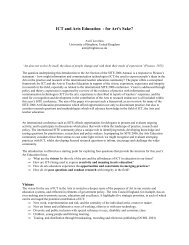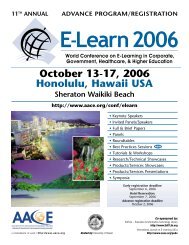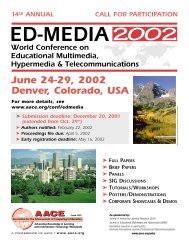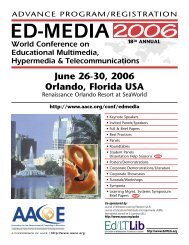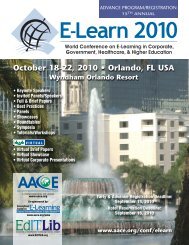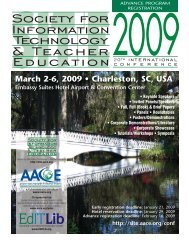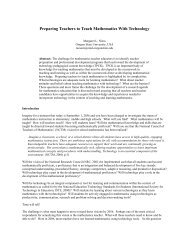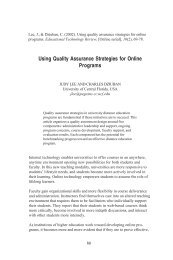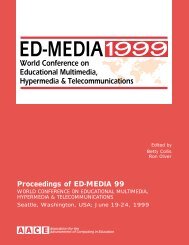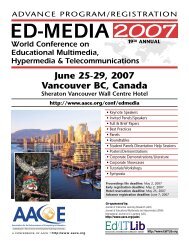ED-MEDIA 1999 Proceedings Book - Association for the ...
ED-MEDIA 1999 Proceedings Book - Association for the ...
ED-MEDIA 1999 Proceedings Book - Association for the ...
You also want an ePaper? Increase the reach of your titles
YUMPU automatically turns print PDFs into web optimized ePapers that Google loves.
Hezinet: Interactive (Adaptive) Education Through Activities<br />
Tomás A. Pérez, Koro Gabiola, Julián Gutiérrez, Ricardo López, Amaia González, Jose Ángel Carro<br />
Dept. of Computer Languages and Systems<br />
University of <strong>the</strong> Basque Country UPV-EHU<br />
Spain<br />
{tomas, jibgacok, gutierrez, jibloprr, jibgogoa, jibcamej}@si.ehu.es<br />
Abstract: Most language learning systems and in general all educational systems accessible<br />
via WWW, lack in individualizing <strong>the</strong> course <strong>for</strong> each student. Adaptive Hypermedia<br />
Systems can offer solutions by controlling <strong>the</strong> student progress throughout <strong>the</strong> course.<br />
Besides, <strong>the</strong>y can provide multimedia interface to students. This paper introduces HE-<br />
ZINET, a project whose goal has been to develop by <strong>the</strong> end of 1998 a commercial product<br />
based on <strong>the</strong> AHS approach <strong>for</strong> learning Basque language. As far as we know, this<br />
product will be <strong>the</strong> first with <strong>the</strong>se characteristics in <strong>the</strong> market.<br />
Introduction and Context: Adaptive Hypermedia Systems <strong>for</strong> Language Teaching<br />
The World Wide Web (WWW) began in 1989 as a mean of transporting research and ideas effectively<br />
(Berners & Cailliau, 1989). In few years, <strong>the</strong> widespread use of <strong>the</strong> WWW has converted it in a very<br />
appropriate medium <strong>for</strong> sharing all kind of in<strong>for</strong>mation. One of <strong>the</strong> uses of <strong>the</strong> WWW is distance learning.<br />
The ideal course would be intelligent and adaptive to <strong>the</strong> user.<br />
Based our experience, currently computer systems <strong>for</strong> language-learning do not adapt to <strong>the</strong>ir students.<br />
The systems we have evaluated do not take into account which concepts <strong>the</strong> student has not been<br />
able to acquire. As Professor Alfred Bork said, "<strong>the</strong>y are alike traditional books badly designed, adorned<br />
with hypertext functionality" (Sáez-Vacas, 1998). For instance, (Kargu-Heldring, 1996) describes an Adaptive<br />
Hypermedia System (AHS) <strong>for</strong> learning Estonian by means of an interactive hypermedia environment.<br />
However, this system does not take into account <strong>the</strong> student model to help understand <strong>the</strong> in<strong>for</strong>mation it<br />
provides. (Johansson, 1998) introduces IKITS, an Intelligent Tutoring System (ITS) that teaches Chinese<br />
individually. System developers say that individuality can be seen when <strong>the</strong> students get tips from <strong>the</strong> system<br />
depending on <strong>the</strong> results of <strong>the</strong>ir interactions. These tips are independent of <strong>the</strong> concepts he has understood<br />
or not. AHSs constitute a new approach <strong>for</strong> educational systems (Urban-Lurain, 1997). Usually,<br />
AHSs combine ITS and Educational Hypermedia Systems (Pérez, Gutiérrez & Lopistéguy, 1995). Because<br />
of this, <strong>the</strong>y get <strong>the</strong> advantages of both to achieve <strong>the</strong> adaptation to <strong>the</strong> student.<br />
The Basque language is spoken in <strong>the</strong> Basque Country, which is situated on <strong>the</strong> North of Spain<br />
and on <strong>the</strong> SouthWest of France. It is not a curiosity of <strong>the</strong> past, but a living language, and <strong>the</strong>re<strong>for</strong>e, plenty<br />
of future. The majority of grown-up population is not Basque-literate, that is why exist centers <strong>for</strong> Basque<br />
learning: <strong>the</strong> so-called "Euskaltegiak". The learning of this language is divided into several levels being <strong>the</strong><br />
last <strong>the</strong> one called EGA ("Euskarako Gaitasun Agiria" or "Basque language Certificate"), which assess a<br />
level of proficiency in written and spoken Basque.<br />
We have built Hezinet-EGA, a language-learning system on <strong>the</strong> web, as a solution <strong>for</strong> people<br />
willing to learn Basque that are not able to assist to <strong>the</strong> Euskaltegiak. With <strong>the</strong> system, <strong>the</strong> students can<br />
learn via Internet at <strong>the</strong>ir own place and pace. A course lasts about 100 hours. The courses to learn Basque<br />
from scratch last 500 hours (10 terms, 50 hours each). EGA-Hezinet cover <strong>the</strong> last two terms. Later on <strong>the</strong><br />
system will be completed to cover <strong>the</strong> o<strong>the</strong>r four courses.<br />
Hezinet-EGA is user-adaptive. The adaptation can be seen in several ways. First of all, since <strong>the</strong><br />
system uses WWW <strong>the</strong> system can be used with any web browser available. Second, <strong>the</strong> system stores in<strong>for</strong>mation<br />
about <strong>the</strong> different students and presents diverse course material according to it. For example, <strong>the</strong><br />
students are categorized into two stereotypes: analytic and Multimedia. Depending on <strong>the</strong>se categories <strong>the</strong><br />
system will present activities ei<strong>the</strong>r full of attractiveness and needing more interaction (multimedia) or<br />
simpler activities visually less attractive using basically text (analytic). Third, <strong>the</strong> system also prepares



